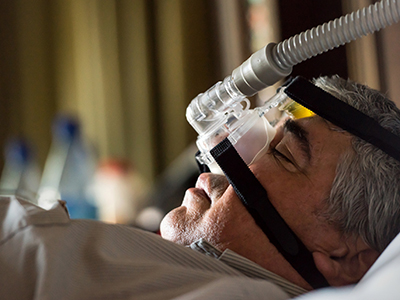
Study shows link between obstructive sleep apnea and occupational injury in BC.
The connection between snoring and risks to public health and safety may not come to mind immediately, but Vancouver Coastal Health Research Institute scientist Dr. Najib Ayas’s research looking at some of the consequences of obstructive sleep apnea (OSA)—the most common type of snoring—illustrate how one person’s poor sleep can be harmful to others.
“I don’t think we take sleep apnea seriously enough,” says Ayas, associate professor in the Department of Medicine at the University of British Columbia (UBC). “Research has shown an association between OSA and safety in terms of motor vehicle crashes and occupational injuries.”
“With occupational injuries, sometimes it’s not just the injured person who is affected by an incident but other people can be injured as well. There are financial consequences to these types of incidents that can impact others too.”

OSA occurs when the throat closes during sleep and is characterised by recurrent asphyxia, choking or gasping for air, and loud snoring. People with OSA experience tiredness during the day and feel as though their sleep is not refreshing. The scale used to measure OSA categorizes the condition according to the number of times that an individual experiences events like choking or gasping for air, in one hour of sleep. A moderate to severe case of OSA involves more than 15 events per hour of sleep, while a severe case is classified by more than 30 events per hour.
In a recent paper, featured in the publication Lung, Ayas and co-authors Drs. AJ Hirsch Allen and Bernardo Peres used provincial data to determine whether individuals with OSA are at increased risk of occupational injury. The researchers looked at individuals who sought a medical assessment for suspected OSA at the UBC Sleep Laboratory between 2003 and 2011, and then linked their data to information from Worker’s Compensation Board claims to see if any of them had experienced occupational injuries. The study found that individuals with more severe sleep apnea tended to have a higher rate of occupational injuries.
Ayas hopes that this information can be used to increase awareness about OSA and workplace injury risks.
“The assumption is that if you can identify individuals with OSA, then you can hopefully mitigate some of those risks with treatment and education.”

“I believe that sleep apnea needs to be incorporated into fatigue risk models that are used, for example, in the airline industry to ensure that pilots are sufficiently rested and alert enough to fly.”
Research fills gap about global health burden of obstructive sleep apnea
Using global data from epidemiological studies, Ayas also took part in the first research effort of its kind to find a more accurate number of how many people worldwide have OSA.
Published in The Lancet: Respiratory Medicine, the study reported that an estimated 936 million middle-aged adults aged 30-69 years have at least mild OSA and 425 million have moderate to severe OSA globally; this includes approximately 1,000,000 adults in Canada. China, followed by the USA, Brazil, and India showed the highest number of individuals with OSA. The majority of these patients have not been clinically diagnosed.
“Our findings tell us about the potential health burden of OSA,” says Ayas. “It allows us to more closely know the number of people who need treatment or diagnosis and highlights the enormous scope of this global problem given that untreated OSA is associated with myriad adverse health outcomes including cardiovascular disease.”


